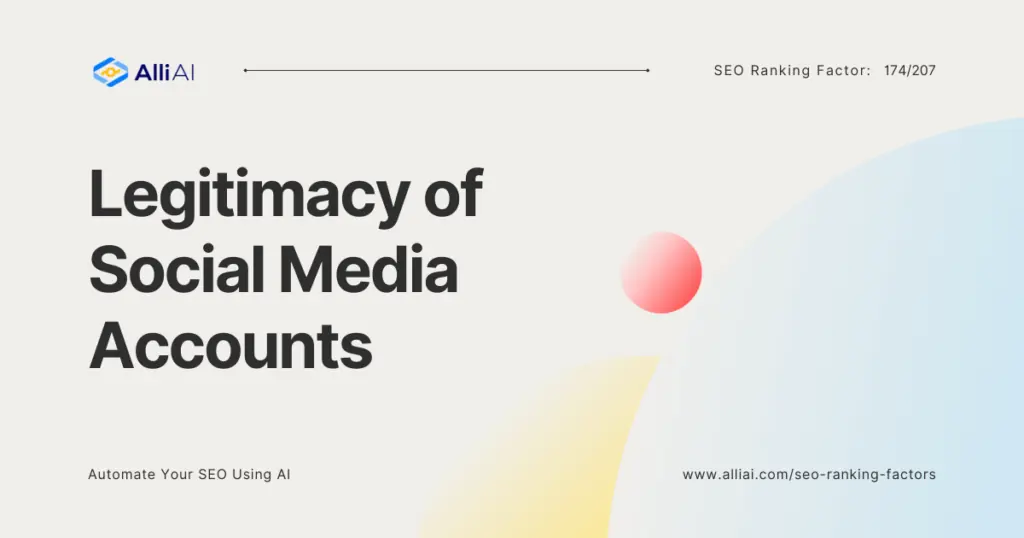Explanation of the Ranking Factor
The legitimacy of social media accounts refers to how genuine, active, and authoritative a brand’s presence is across social platforms. Factors such as the age of the account, follower count in proportion to engagement rate, consistency of postings, and the quality of interactions (likes, comments, shares) contribute to its legitimacy. Think of it as the digital equivalent of a credit score for businesses on social media. Just as a good credit score can unlock favorable lending terms, a legitimate social media account can unlock greater visibility online.
Consider a marketplace where numerous vendors are selling similar products. Shoppers would likely gravitate towards the vendor who not only advertises their product but also engages in genuine conversations, provides valuable information, and has a crowd of satisfied customers around their booth. This vendor’s authenticity and engagement level make them stand out. Similarly, in the vast digital marketplace, legitimate social media accounts signal to search engines that a brand is credible and valued by its audience, thus deserving a better ranking spot.
Why is the Legitimacy of Social Media Accounts Important in SEO?
In the SEO realm, relevance and authority are key. Search engines, particularly Google, continuously refine their algorithms to prioritize user experience. This includes surfacing content from sources that users find trustworthy and engaging. A legitimate social media presence bolsters a brand’s authority by demonstrating active participation and cultivation of community. It signals to search engines that the brand not only exists but thrives in the engagement with its audience, making its content more likely to be relevant and valuable to searchers.
How the Legitimacy of Social Media Accounts Affects SEO
The authenticity and engagement levels of a brand’s social media presence can indirectly impact its SEO rankings. While the direct influence of social signals on SEO rankings is a subject of ongoing debate among SEO professionals, the consensus leans towards a significant correlation.
1. Website Traffic: Legitimate social media accounts drive more organic traffic to your website. Sharing valuable content leads people to click through to your website, boosting traffic—a factor search engines consider when ranking sites.
2. Brand Visibility and Awareness: Regular engagement on social media increases your brand’s visibility. As more people talk about your brand online, it gains more authority, which search engines are likely to reward with higher rankings.
3. Link Building: High-quality content shared on legitimate social media accounts is more likely to be linked back by other content creators. Links remain a strong ranking signal for search engines, thus affecting a website’s position in SERPs.
Relevant Stats: According to a survey by BrightLocal, 87% of consumers read online reviews for local businesses in 2020—an increase from 81% in 2019. This underscores the importance of positive social proof and legitimacy on digital platforms. Additionally, a study by Hootsuite and We Are Social revealed that there are now more than 4.5 billion social media users around the globe. This vast audience and the potential for engagement further highlight the critical role of social media authenticity in amplifying a brand’s reach and influence.
FAQ
How can businesses improve the legitimacy of their social media accounts?
Focus on consistently posting high-quality content, engaging genuinely with followers, and building a community around your brand. Use analytics to refine your strategy based on what resonates with your audience.
Can the legitimacy of social media accounts directly impact search engine rankings?
While social signals are not a direct ranking factor according to Google, the indirect benefits—such as increased traffic, improved brand recognition, and enhanced link-building opportunities—can positively affect SEO.
What role does follower count play in the legitimacy of social media accounts?
While a high follower count can indicate popularity, engagement rate is a more significant measure of legitimacy. Accounts with a high engagement rate (likes, comments, shares) signal an active and interested audience, which is more valuable than a large but passive follower base.
Conclusion
In the digital age, the legitimacy of social media accounts has become increasingly important in defining a brand’s online presence and authority. While not a direct ranking factor, the influence it wields in enhancing a website’s traffic, visibility, and user engagement can indirectly boost SEO performance. As search engines evolve to prioritize user experience, the authenticity and engagement of a brand’s social media presence will remain vital components of a successful SEO strategy. Prioritizing the development of genuine relationships with your audience through social media can elevate your brand’s authority and, ultimately, its search engine rankings.






